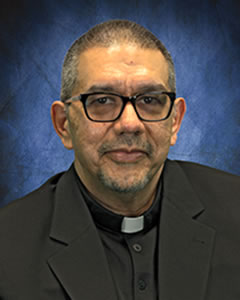
From the Director
 The struggle of any missionary is to give effective aid to those who are in need. Yet, it is difficult to determine in what form do we aid others. In the 1990’s when I was as seminarian, a man came knocking on our center house’s door. I was the only person present at the time. The man wanted to speak to a priest. I informed him that none was around. He asked who I was. “A seminarian,” I replied. “Great! Can I talk to you?” he asked. I let him in, and we conversed. The man said he was dying of an incurable cancer and didn’t have the money to pay his medicines. He produced several medical documents confirming his condition. After, he talked about meeting Columbans in other areas of Chile. He was knowledgeable about several of our men, therefore, he sounded legit. Feeling pity for him, I gave him about $50, a good sum that day. Months later, the man returned asking for me. Another Columban saw him and told me, “that guy has been dying for years.” Meaning, he was a conman. Truly, I felt angered that I fell for his story. I refused to see him, but he insisted. Finally, I decided to confront him. The man poured out his heart to me saying that his family, wife, etc., all thanked me for being so generous and compassionate. Than he came to the point, can I give him more money. I said I had none. He asked if I could get it from the other priests. I said yes, but I won’t disturb them. With this, he knew the game was over, got up, shook my hand and left. I never saw him again.
The struggle of any missionary is to give effective aid to those who are in need. Yet, it is difficult to determine in what form do we aid others. In the 1990’s when I was as seminarian, a man came knocking on our center house’s door. I was the only person present at the time. The man wanted to speak to a priest. I informed him that none was around. He asked who I was. “A seminarian,” I replied. “Great! Can I talk to you?” he asked. I let him in, and we conversed. The man said he was dying of an incurable cancer and didn’t have the money to pay his medicines. He produced several medical documents confirming his condition. After, he talked about meeting Columbans in other areas of Chile. He was knowledgeable about several of our men, therefore, he sounded legit. Feeling pity for him, I gave him about $50, a good sum that day. Months later, the man returned asking for me. Another Columban saw him and told me, “that guy has been dying for years.” Meaning, he was a conman. Truly, I felt angered that I fell for his story. I refused to see him, but he insisted. Finally, I decided to confront him. The man poured out his heart to me saying that his family, wife, etc., all thanked me for being so generous and compassionate. Than he came to the point, can I give him more money. I said I had none. He asked if I could get it from the other priests. I said yes, but I won’t disturb them. With this, he knew the game was over, got up, shook my hand and left. I never saw him again.
The inevitable question is, are there deserving poor and undeserving poor?
Years later as a priest, I was working in an urban parish of Santiago, Chile. We had opened a communal kitchen where we offered cooking classes for women so they could sell their baked goods. Furthermore, we organized a children’s summer camp for two weeks. Organized activities made the day fun for the children. The communal kitchen was filled with youth volunteers who prepared meals for the children. The summer camp was a way of getting the children off the streets, not be exposed to gangs and other harmful elements, and receive a good meal. However, one evening, rioters looted our compound and stole the refrigerator, oven, and many utensils of our communal kitchen. It was disheartening to see those from the very community destroy that which helped their community. I didn’t think we would recover. However, the following day, many from the parish came forward and donated items such as a used refrigerator and oven. It was great to see the solidarity amongst the people.
The inevitable question is, are there deserving poor and undeserving poor? The Gospel response is difficult for many of us as there is no distinction. The Gospel mandate is simple and forward: “For I was hungry and you gave Me something to eat, I was thirsty and you gave Me something to drink; I was a stranger, and you invited Me in; naked, and you clothed Me; I was in prison, and you visited Me.” Matthew 25: 35-36 Obviously, the conman angered me at the time. Did he deserve what I gave him? Wouldn’t it have been better to send him to the communal kitchen? Years later, I think of that moment and the man. Truly, I didn’t know his situation, what lead him to live his life that way, nor could I determine if what I gave truly helped him. As missionaries we try to be effective and organized in our aid to those in need like the parish communal kitchen. However, there are moments when we have to make a spontaneous call and take a leap of faith. After all, the man needed the money more than I did regardless of his condition. Who am I to judge? I will never know, but I trust the Spirit knows. The following quote from Dorothy Day helped me let go of my resentment against that man and look upon him as those in the communal kitchen: The Gospel takes away our right forever, to discriminate between the deserving and the undeserving poor.